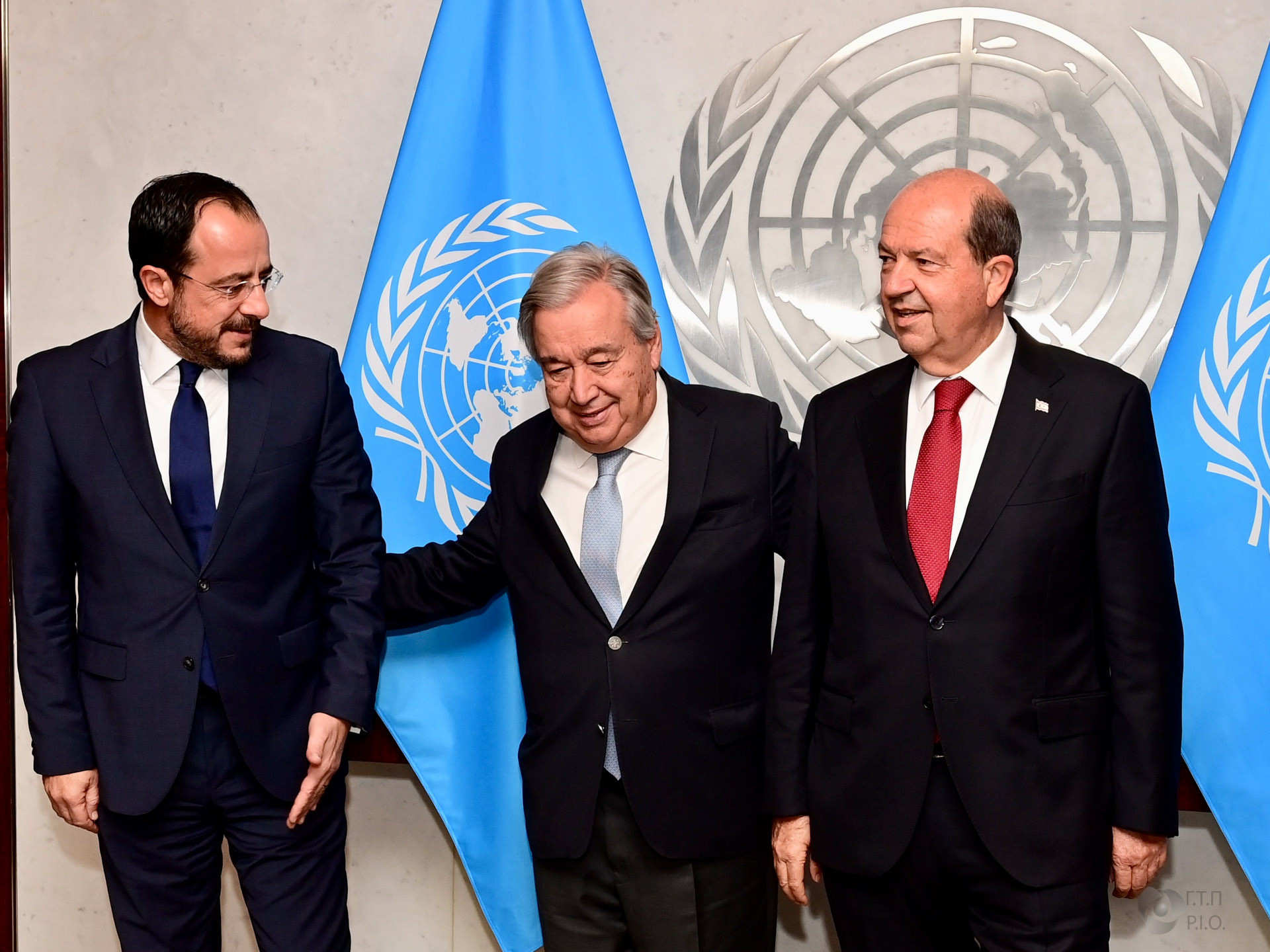All eyes are fixed on whether the two leaders in Cyprus will be willing and able to engage sufficiently to allow an informal five-party meeting with the three guarantor powers to take place in the coming months.
President Nikos Christodoulides and Turkish Cypriot leader Ersin Tatar both agreed to the prospect during the tripartite informal dinner they attended in New York in the early hours of Wednesday with the UN secretary-general.
Antonio Guterres was attempting to reintroduce some sort of movement to the stalled process after his personal envoy Maria Angela Holguin failed, despite months of efforts to find common ground for a resumption of negotiations.
With a renewed but muted vestige of hope accompanied by a degree of uncertainty, and despite polar-opposite positions as to the way forward, Guterres got them to agree to a broader informal meeting “in the near future” under his auspices. This meeting would include the three guarantor powers, Greece, Turkey and Britain.
The leaders also agreed to meet in Cyprus to explore the possibility of opening new crossing points along the 180km buffer zone.
Some observers suggested it was the best possible outcome in the circumstances.
Although no timeframe has been given for a five-party informal meeting, speculation has already begun. Some reports suggested such a conference might only take place depending on what the leaders do in the coming period.
Others say it could be as early as next month. One said it could happen after a planned meeting between the Greek and Turkish foreign ministers in Ankara in January.
Given the continued adamance of Tatar in avoiding any kind of interaction, it is believed that Ankara gave its blessing to the New York tripartite. The Turkish Cypriot leader was also said to initially be opposed to British participation in the proposed five-party informal meeting.
The UN said Guterres had encouraged Christodoulides and Tatar in the meantime to consider “how to bridge the gap in their positions” and rebuild trust that would allow the movement necessary to lead to a settlement.
“The leaders agreed to have an informal meeting in a broader format in the near future, under the auspices of the secretary-general, to discuss the way forward,” the UN readout said. They would also hold informal meetings in Cyprus related to the crossings. The UN chief described the tripartite meeting as “good”.
Although he made clear the UN’s commitment and engagement with the Cyprus issue, Guterres expressed regret that despite the efforts of his personal envoy Holguin, no common ground had been found.
Tatar has opposed Holguin’s return to the role leaving the likely coordination of the leaders’ informal meetings in Cyprus to UN Under-Secretary General for Political and Peacebuilding Affairs Rosemary DiCarlo.
Christodoulides later on Wednesday said he was satisfied with the outcome even though core disagreements remain entrenched.
He said the main focus for Nicosia had been keeping the dialogue ongoing between the parties, and this was assessed as having been achieved.
Christodoulides who was departing after the dinner on his way to Brussels for a European Council meeting, said various issues had been “openly discussed” but he had not heard anything new from Tatar.
“We are not there yet,” the president said when asked about positive developments.
In the afternoon, government spokesman Konstantinos Letymbiotis posted on social media that there would be a National Council meeting to brief the political parties on October 22.
“The commitment to the goal of resuming negotiations within the agreed framework remains constant, the desire of all of us to resolve the Cyprus issue is common, just as the effort must be common,” he wrote.
Meanwhile, Tatar said after the dinner that “many things were discussed”, that the next step will be a wider meeting with the guarantor powers, and that he had agreed to meet Christodoulides on the crossing points.
Tatar reiterated that his demand was for sovereignty and equal legal status for the ‘TRNC’.
“If our sovereign equality and equal international status are not confirmed, we will not sit down to official negotiations,” he said.
The informal nature of the mooted contacts is seen as a face-saving nod to Tatar who would dig his heels in on anything official.
Speaking to journalists at the meeting’s conclusion Tatar said the Turkish Cypriot position remained the same as three years ago in Geneva.
He added that the UNSG had been present at Crans-Montana and “knew very well why the process had collapsed there”. Tatar also said he had been elected in 2020 based on a new vision, which he had presented in Geneva.
“We have a responsibility to our people to explore ways forward and that is why I attended the dinner,” he said, underscoring it had been informal and without any agenda.
“We discussed many issues but […] I maintained my positions,” he said.
He added that consultation with Turkey would bring the next steps.
The Cyprus News Agency on Wednesday cited sources saying the way forward would be a two-track process.
The dinner, according to the sources, began with an intervention by Guterres who said that there was a need for an open discussion with “out of the box” ideas.
Guterres reportedly said that he had undertaken the initiative as someone who understood Cyprus because of the situation in the region.
He added that although the two sides had different starting points, with one leader talking about sovereign equality and the other about UN resolutions, he believed that gradually some elements for discussion could be found.
Regarding the future of the process, although the UN chief did not refer to Holguin’s report, he raised the issues of governance and guarantees, expressing his belief that a discussion could be held on the basis of what the Greek Cypriot side said in Crans-Montana in 2017 that the external guarantees could not be maintained.








Click here to change your cookie preferences